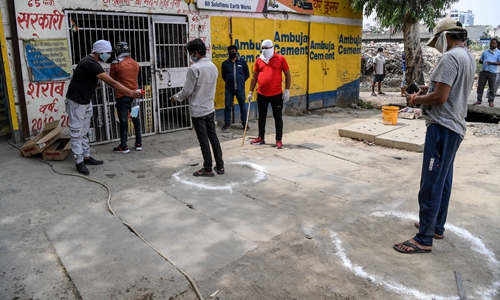India is welcome to return to RCEP talks: Commerce Ministry
Source:Global Times Published: 2020/5/18 14:28:40

An Indian shopkeeper sprays a disinfectant on customers' hands as they stand on marked circles to buy alcohol from government-run liquor shops in Ghaziabad, India in May. Photo: AFP
Beijing will welcome India back to negotiations on the Regional Comprehensive Economic Partnership (RCEP) at an appropriate time, Chinese Vice Minister of Commerce Wang Shouwen told a press conference on Monday.
Talks on the regional free trade deal are proceeding smoothly, with participating members in intense discussions on a few remaining issues, Wang said.
Nearly 80 percent of the deal's text has undergone legal review, which is expected to be completed by June, according to the vice minister.
If the RCEP can be signed this year, it would reverse the negative impact that the COVID-19 pandemic has had on regional trade and investment. More importantly, it would help local economies restart growing promptly in the post-pandemic era, said Wang.
China and 14 partners in the Asia-Pacific region - the 10 member states of the Association of Southeast Asian Nations, as well as Australia, Japan, South Korea and New Zealand - concluded years of negotiations for the RCEP in November 2019, although India withdrew from the deal over concerns that its manufacturing and agriculture will be harmed by the deal.
Recognizing India as a valuable original participant, the 15 RCEP Participating Countries (RPCs) said they would welcome India's return to the negotiations, according to the joint statement of the 29th RCEP Trade Negotiating Committee (RCEP TNC) Meeting held via video conference in late April.
The 15 RPCs reaffirmed their commitments to signing the agreement in 2020, stressing that as a region-wide free trade area, the RCEP would provide a more stable and predictable economic environment to support the much-needed recovery of trade and investment in the region.
India did not attend the April online meeting. In February, Indian representatives were also absent from negotiations held in Bali, Indonesia.
"Given the current standoff, it is not pragmatic for other members to wait for India to sign the deal," said Long Xingchun, director of the Center for Indian Studies at China West Normal University.
Long told the Global Times on Monday that other members could first sign the agreement and put it into effect while pursuing negotiations with India. "RCEP progress cannot be obstructed by India, which seems unwilling to rejoin the negotiations soon."
The COVID-19 pandemic could, to some extent, act as a catalyst for India's return to the table, Long noted.
"India has become inward-looking as it seeks to boost its own manufacturing and medical industries through the health crisis, though the realization of that process is highly reliant on foreign investment and industrial upgrading. India needs to become more integrated in the Asia-Pacific region, which it could achieve through joining RCEP," Long said.
Despite short-term costs for India if it joins the RCEP, the South Asian country should take a long-term view of its industries and economy, he added.
Global Times
Posted in: ECONOMY